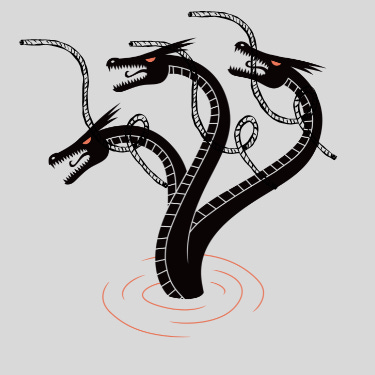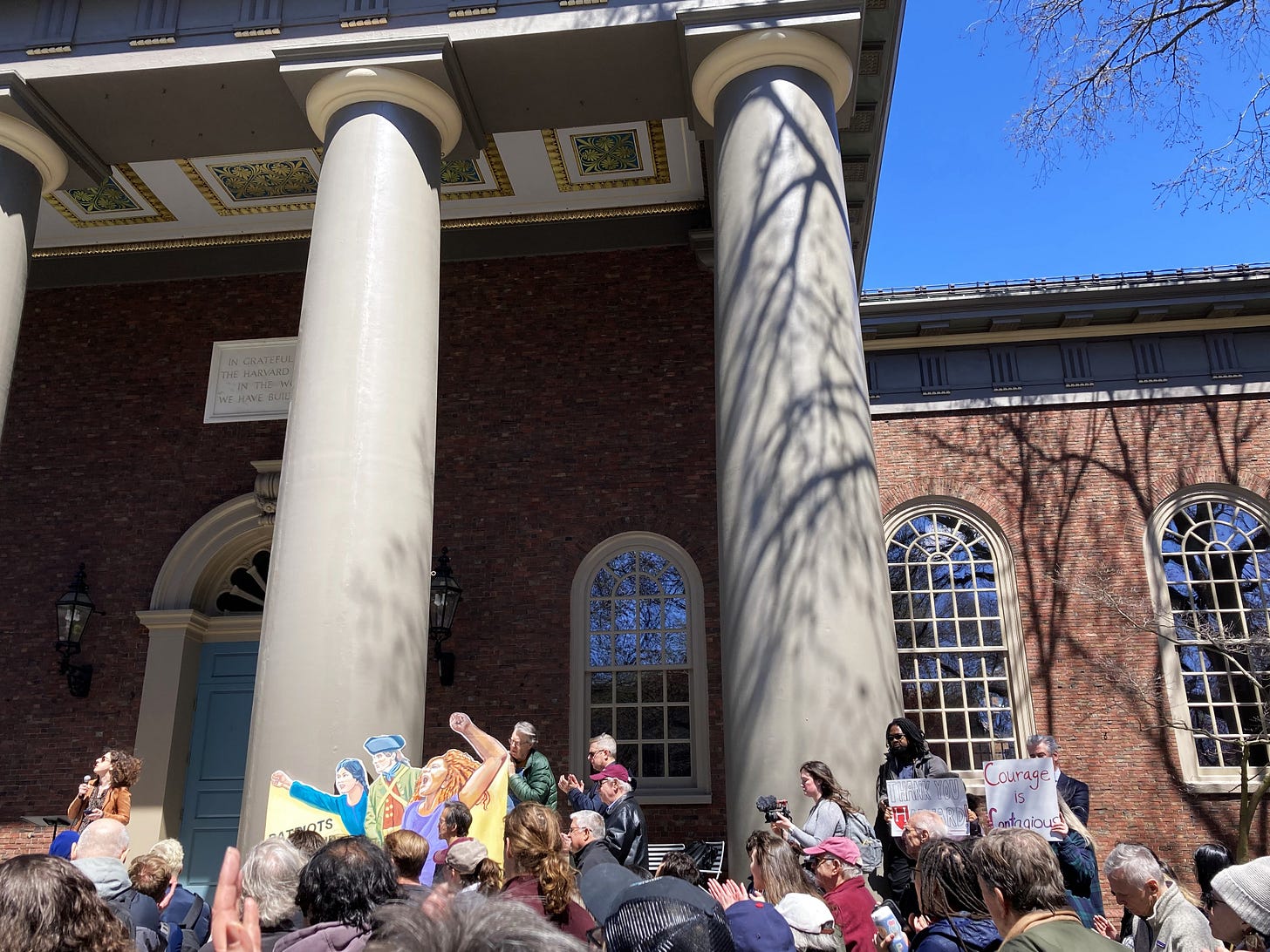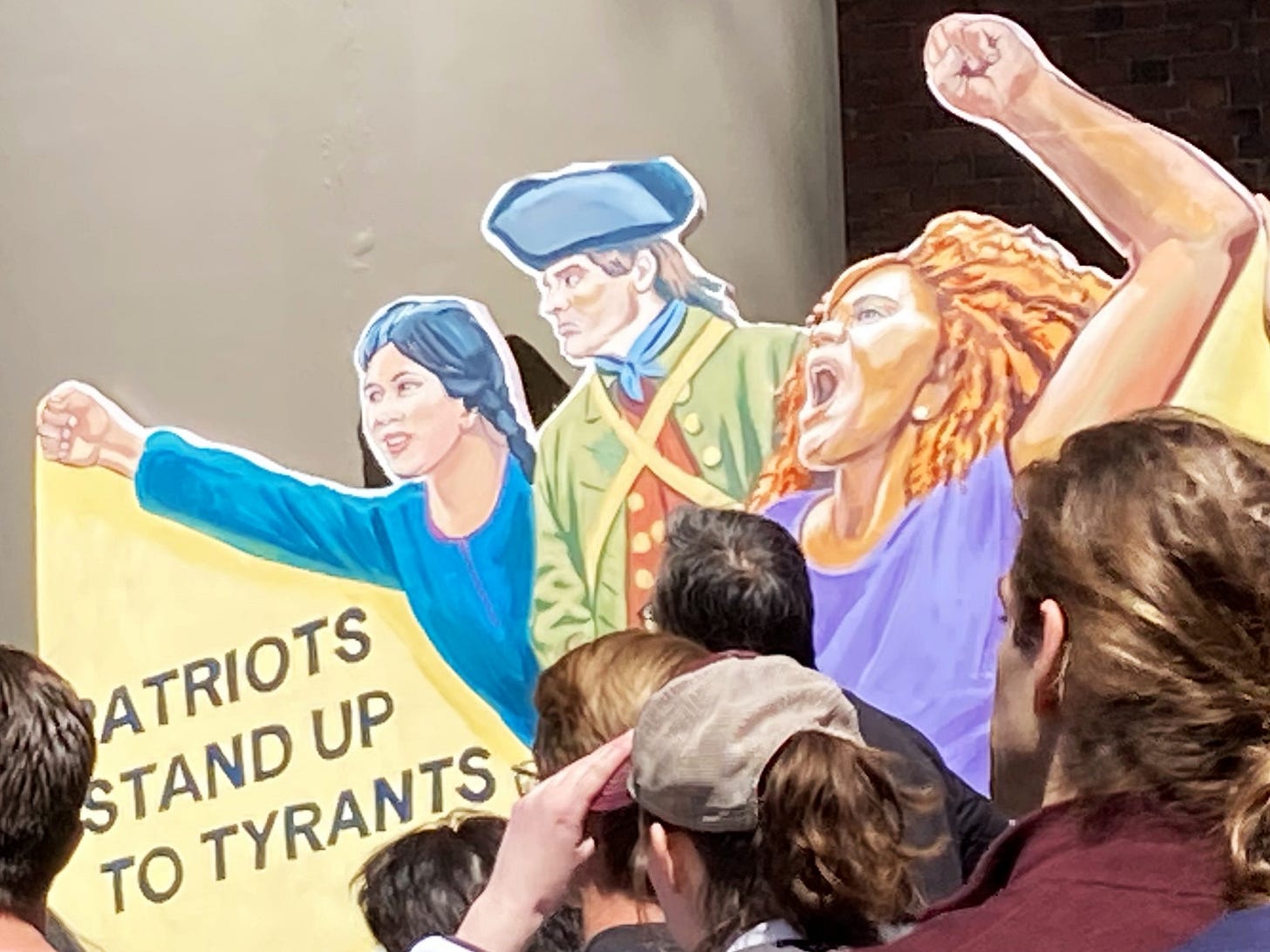It has been a long winter here in New England, but now signs of spring are popping up. Color is blooming in the trees, and warmth is pushing through the chill. Our atrocious political environment shows hints of green shoots, too.
Many of us no longer harbor illusions about the gravity of this moment and the threat to our democracy and liberties posed by the present administration. I won’t offer a detailed review of horrible events, because you know what is happening — the international graduate students being snatched off the streets for expressing opinions, the immigrants being swept up and sent to a foreign prison without due process, the sledgehammer assault on the independence of universities and law firms, the abrogation of longtime international alliances, the reckless imposition of tariffs/taxes, the overall elevation of callousness and cruelty in our society, and more. We are in the midst of a cataclysm that one of my favorite podcasters, Nate Hagens of The Great Simplification has described as the battle between life and power. By “life” I think Hagens means all that is green, humane, and generative, and by “power,” I think he means all the destruction that is unleashed when “dark triad” values (narcissism, psychopathy, Machiavellianism) reign. Power, as it is currently consolidating, in the Trump administration’s Washington DC has taken the form of a mythological “many-headed hydra” with a monstrously wide, ravenous reach.
Of course the emergence of a monster like this would be met with dread. After the presidential inauguration, headline after headline included the word “fear.” People from a range of demographic groups shuddered at what Donald Trump might do, and now we see that our worries were well founded.
We have been snatched out of our past reality and hurtled into an existentially different one. Elsewhere I have called this zone Butler Territory (as in Octavia Butler’s Parable series). Lately, I have been telling myself and others that we are living in The Upside Down world. I only watched one season of Stranger Things, and I am not a huge science fiction or fantasy fan, but increasingly, I have been thinking in terms of SF/F lexicons and metaphors. I’ve noticed others doing this, too. This week, someone in my orbit commented that Harvard has drawn the eye of Sauron, a reference to the evil necromancer in The Lord of the Rings trilogy. Nate Hagens also uses this expression to indirectly reference the governmental powers that be. For me, Lord Voldemort, or “He Who Shall Not Be Named,” has become a recurring thought as I catch people (myself included) thinking twice about using the president’s name in public spaces or in writing.
If we are so far beyond familiar territory that we are reaching for fantasy narratives to try to explain our situation, perhaps we should lean all the way in. We can remind ourselves of who the heroes and villains are in those stories (the small vs. the mighty), of what the oppressive threat is (an expanding tyrannical evil), and of how that threat is vanquished (characters banding together while undergoing trials – and wielding a little bit of magic). At the end of these sagas, goodness prevails, and freedom from tyranny is assured.
None of us, not even most Trump voters, chose this “long emergency,” but here we are standing in the place of beloved characters. In a way, it is a privilege to be living in a time when the honor of our nation is at stake — because we get to fight for it together. This may well be the greatest story of the 21st century, and we can be the heroes. All of us make up the fellowship of the ring that will save the day for democracy. Leah Greenberg, co-executive director of Indivisible, points out in the weekly “What’s The Plan” Zoom chats that there will be a post-Trump era, and when it arrives every choice made now will be seen in a new light.
There are signs all around that people are ready to forge a fellowship. Senator Bernie Sanders and Congresswoman Alexandria Ocasio-Cortez have been barnstorming across the Midwest, Southwest, and West in their sold-out Fighting Oligarchy tour. Senator Cory Booker delivered his breathtaking marathon speech highlighting the harm of Trump’s actions and besting Strom Thurmond’s record. On April 5th, millions of people protested across the country and abroad in nonviolent “Hands Off” events. The next week, and surely buoyed by this show of courage, Harvard University publicly refused to accede to Trump administration demands. At the same time, judges across the system have attempted to hold the administration to account for lawless behavior. This political, popular, and institutional resistance must grow and endure if we are to bind the hydra.
In the meantime, there will be pain for the direct targets of this administration, for those who choose to stand up for the rule of law, and for many everyday Americans who are losing their jobs and benefits and watching the value of their retirement savings plummet. It does no good to look away from this harsh reality. As others who are perhaps more vulnerable than us bear the brunt of punishment first, we will need to assist, stretch, and sacrifice. And when we find that the tables have turned, and we are the ones in deep trouble, we will need to ask for and receive help. Certainly, withstanding the current and coming assault will require a reordering of our priorities and a reallocation of our time and resources. We must somehow continue the work of caring for our families, doing our jobs, and maintaining our health while keeping in mind that this is The Upside Down world where real monstrosities dwell. Business as usual is over. The existential battle between life and power is on.
Yesterday, Harvard and Cambridge community members held a rally on the steps of Memorial Church to celebrate our school’s resistance and to support international students, who are now broadly under threat by the Department of Homeland Security. It was a pretty spring day, one of the few we have had this season. Hope and fear mingled with petals in the fragrant air. Many of the folks gathered there felt deep relief and fierce pride at Harvard’s refusal to bow before a would-be king. Many also recognized that those who seek ultimate power and have endless money and broad enforcement capacity will try to crush anyone who resists their authority.
A close faculty colleague, also from Cincinnati, spoke to me from a spot in the Yard during the rally. “Are you ready for summer?” he said. “Because it’s going to get a lot hotter here.”
He meant the battle for Harvard’s independence from authoritarian governmental control, a test case for the nation, was going to intensify, and fast. He meant that we have much to lose. “It can get more gone,” he said, referring to what the university has already lost (over $2 billion in federal funding, jobs, office space, a sense of security). And he is right. It is smart to try to picture the worst endgame in which Harvard goes down in smoke and dust beneath the heel of the tyrant, and the eventual demise of our democracy in all but name follows.
It is equally crucial to envision an alternative scenario: the fellowship takes up its noble quest, surges in size, catches magic, and wins.
PS: On Friday The New York Times reported that the government had sent the draconian letter to Harvard in error and that it was merely a draft (on formal letterhead, signed by three government officials, and emailed from the official account of the person who had been handling communications). Clown show? Plot twist? We shall see. Let’s remember, too, that chaos is a weapon.
Takeaways:
- I spoke with Michel Martin on Amanpour & Co. about the Smithsonian Museum of African American History and Culture and Trump’s recent executive order on history. I am self-conscious about being on video, but I think I should share this one.
-I’ve been watching The Bulwark podcast on YouTube nearly every night for a recap of the news and incisive opinions that remind me I’m not alone. (BTW: Sarah is always right.)
-Listening to George Saunders’s analysis of Russian resistance literature in the audio version of his book, A Swim in a Pond in the Rain, has been edifying.
-Viewing Parkrose Permaculture's informed, impromptu political commentaries (and admiring her lovely handknits) on YouTube has given me a boost.
-My husband and I rewatched the film adaptation of Stephen King’s The Mist. We found the story of a town surrounded by a mysterious mist full of deadly monsters grimly satisfying. Lesson: amid disaster, never give up.
Although I used them differently, phrases that came to mind as I wrote this essay were probably prompted by my past reading of these books:
Peter Linebaugh, The Many-Headed Hydra: Sailors, Slaves, Commoners, and the Hidden History of the Revolutionary Atlantic (Verso, 2000).
James Howard Kunstler, The Long Emergency: Surviving the End of Oil, Climate Change, and Other Converging Catastrophes of the Twenty-First Century (Grove Press, 2006).








Gandalf: Some believe it is only great power that can hold evil in check, but that is not what I have found. It is the small everyday deeds of ordinary folk that keep the darkness at bay.
Tiya. Thanks so much for your thoughtful post. I was especially heartened by your institution's decision to push back, in spite of "the error". I also appreciate your pictures of spring flowers and remarks about the conversations in The Yard. It is time for courage, not complacency, and recognition of the importance of timing. I look forward to your words. But most importantly, no one is alone and we need one another's support. You certainly have mine!